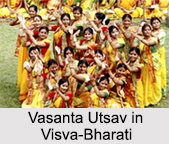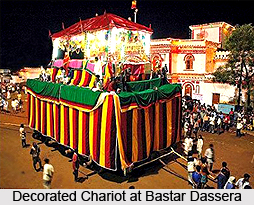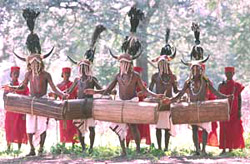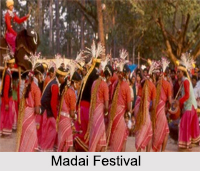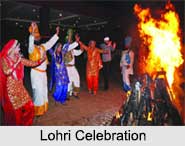 Lohri is a Punjabi folk festival celebrated every year on 13th of January. It is a festival of worshipping the fire. It is celebrated chiefly by Sikhs and Hindus from the Punjab region of India. It is also celebrated in several parts of Northern India as well. Lohri is celebrated to mark the end of peak winter and is usually associated with the harvest of the "rabi" crops.
Lohri is a Punjabi folk festival celebrated every year on 13th of January. It is a festival of worshipping the fire. It is celebrated chiefly by Sikhs and Hindus from the Punjab region of India. It is also celebrated in several parts of Northern India as well. Lohri is celebrated to mark the end of peak winter and is usually associated with the harvest of the "rabi" crops.
History of Lohri
The history of Lohri is as old as that of story of Indus Valley civilization itself. According to the cultural history of Punjab, during the reign of Akbar "Bhatti", a Rajput group inhabited the parts of Rajasthan, Punjab and Gujarat. Dulla Bhatti, Raja of Pindi Bhattian, was put to death by the Mughal king for revolting against him who robbed the rich and gave to the poor. The people of the area loved and respected him and people remember their hero every year on Lohri. According to folklore, in ancient times Lohri was celebrated at the end of the traditional month when winter solstice occurs. Some people believe that Lohri has derived its name from Loi, the wife of Saint Kabir. According to another legend, "Holika" and "Lohri" were sisters. While the former perished in the "Holi" fire, the latter survived with Prahlad.
Celebrations of Lohri
Lohri is a festival dedicated to fire and the Sun God. According to common belief, this is an auspicious day to take holy dip and give away charity. During the day, children go from door to door singing folk songs and sweets with money given to these children. Turning them back empty-handed is regarded ill-fated. Where families are welcoming newly-weds and new- borns, the requests for treats increases. The collections gathered by the children are known as Lohri and consist of `til`, "gachchak", "crystal sugar", "gur" (jaggery), "moongphali" (peanuts) and "phuliya" or popcorn which are also thrown into the fire. Lohri is then distributed at night during the festival. For some, throwing food into the fire represents the burning of the old year and starts the next year on "Makar Sankranti".
The bonfire ceremony differs depending on the location in Punjab. In some parts, a small image of the folk Lohri Goddess is made with "gobar" (cow dung) decorating it, kindling a fire beneath it and chanting its praises. The folk Lohri goddess is believed to be an ancient aspect of the celebration and is part of a long tradition of winter solstice celebrations manifesting as a God or Goddess. The bonfire is lit at sunset in the main village square. People throw sesame "seeds", "gur", "sugar-candy" on the bonfire, sit around it, sing and dance till the fire dies out. This is to show respect to the natural element of fire. It is traditional to present "til", "gachchak", "gur", "moongphali" (peanuts) and "phuliya" or popcorn to the guests. Milk and water is also poured around the bonfire by Hindus to thank the Sun God and seeking his continued protection. Among some sections of the Sindhi community, the festival is traditionally celebrated as "Lal Loi". On the day of "Lal Loi" children bring wood sticks from their grandparents and aunties and light a fire burning the sticks in the night with people enjoying, dancing and playing around the fire.
Lohri celebrations reach a higher pitch of enthusiasm in the houses that have recently had a marriage or childbirth. Singing and dancing form an intrinsic part of the celebration. People wear their brightest clothes and come to dance "bhangra" and "gidda" to the beat of the dhol. Punjabi songs are sung, and everybody rejoices. "Sarson da saag" and "makki di roti" is generally served as the main course at a Lohri dinner.
Significance of Lohri
Lohri festival has a great social significance and is celebrated as a day of imparting social love to one and all. Lohri is meant to help people from worldly day to day routine and make them relaxed, happy and joyful. It is the time, when people from all castes and social strata come together forgetting all past differences and grievances. Every year, Lohri succeeds in bridging the social break, as people visit homes, distribute sweets and welcome each other. Lohri is related to the harvest season and crop and fruitfulness festivals have special importance for an agrarian country like India.

